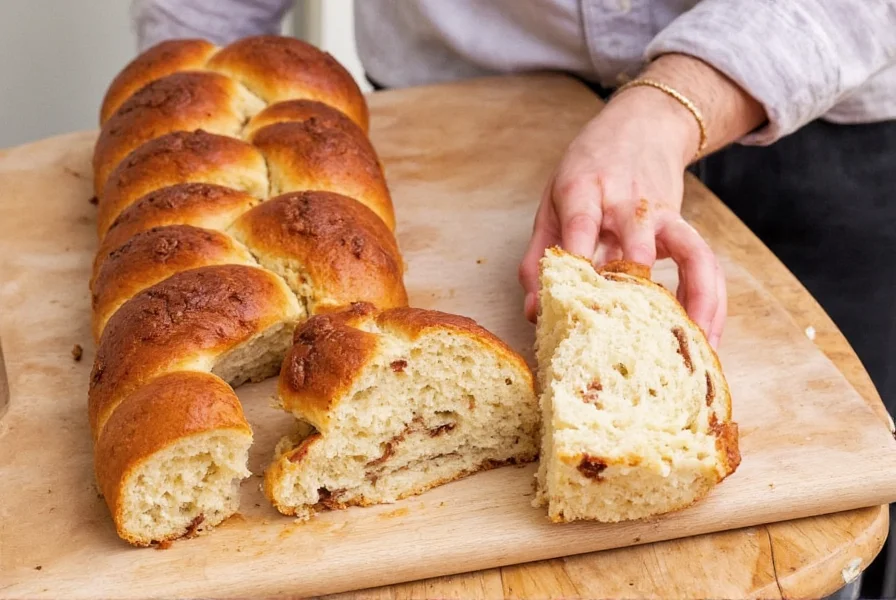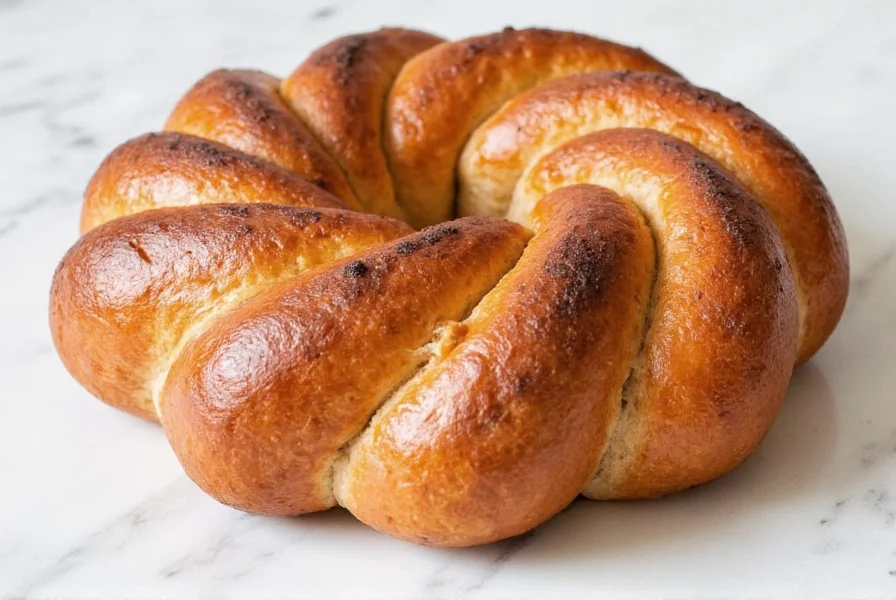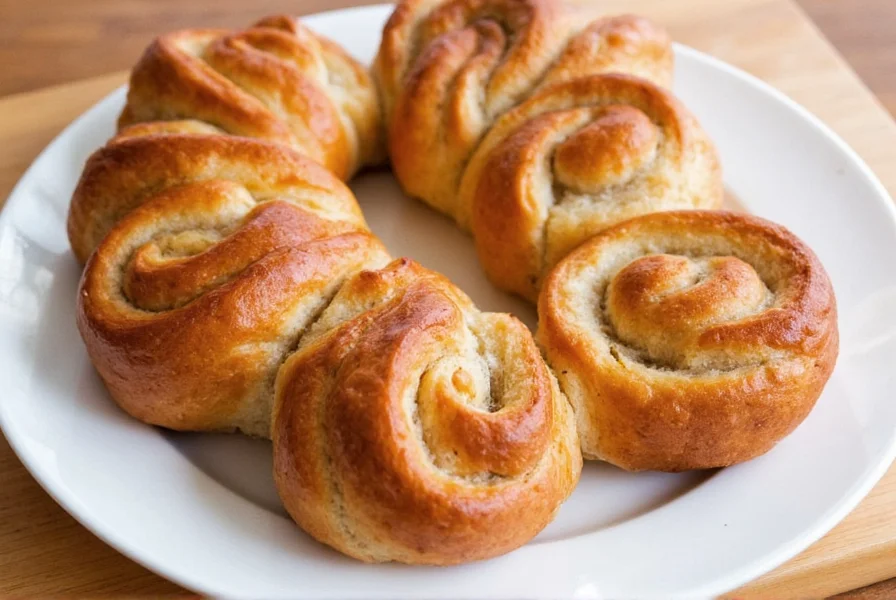If you've ever wondered how to make authentic cinnamon babka from scratch, you've come to the right place. This traditional Eastern European dessert combines the richness of brioche with the comforting warmth of cinnamon sugar, creating a marbled masterpiece that's become popular worldwide. Unlike simplified versions, this recipe honors the babka's heritage while providing clear guidance for home bakers of all skill levels.
The History Behind Cinnamon Babka
Babka originated in Jewish communities of Poland and Ukraine during the 19th century. The name literally means "grandmother" or "old woman" in Polish, possibly referring to its humble, home-baked nature. Traditional babka was made with leftover challah dough, twisted with cinnamon sugar or chocolate filling. While chocolate babka has gained popularity in America, the cinnamon version remains the original classic that many Polish and Jewish families still prepare for holidays and Shabbat.
| Ingredient | Measurement | Key Purpose |
|---|---|---|
| All-purpose flour | 4 cups (500g) | Provides structure while maintaining tenderness |
| Active dry yeast | 2¼ tsp (7g) | Essential for proper rising and flavor development |
| Whole milk | 1 cup (240ml) | Creates richer texture than water-based doughs |
| Unsalted butter | ½ cup (113g) | Contributes to flaky layers and rich flavor |
| Eggs | 2 large | Enhances structure and creates golden crust |
Why This Cinnamon Babka Recipe Works
Many cinnamon babka recipes fail because they use incorrect dough hydration, improper rising conditions, or inadequate filling techniques. This authentic approach addresses all these issues with professional baking insights you won't find in simplified versions. The dough contains just enough fat to create tender layers without weighing down the yeast, while the cinnamon sugar mixture includes a touch of espresso powder that enhances the spice notes without making the babka taste like coffee.
Essential Equipment for Perfect Babka
While you don't need specialized equipment, these tools make the process significantly easier:
- Stand mixer with dough hook (hand-kneading takes 15-20 minutes)
- 9x5 inch loaf pan (standard size for proper rise)
- Digital thermometer (critical for checking dough and internal bake temperature)
- Parchment paper (prevents sticking without greasing)

Step-by-Step Cinnamon Babka Instructions
Dough Preparation
- Warm milk to 110°F and dissolve yeast with 1 tsp sugar. Wait 5-10 minutes until foamy.
- In stand mixer, combine flour, remaining sugar, salt, and softened butter. Mix on low.
- Add yeast mixture and eggs, mixing until dough forms.
- Knead 8-10 minutes until smooth and passes windowpane test.
- Cover and rise at 75-80°F for 1.5-2 hours until doubled.
Filling and Shaping
- Mix 1 cup sugar, 3 tbsp cinnamon, 1 tsp espresso powder, and ¼ tsp salt.
- Roll risen dough into 18x12 inch rectangle on floured surface.
- Spread softened butter evenly, then sprinkle cinnamon sugar mixture.
- Starting at long end, roll tightly into log. Pinch seam to seal.
- Cut log lengthwise, twist strands, and tuck ends into loaf pan.
Professional Baking Tips for Cinnamon Babka
Even experienced bakers encounter issues with babka. Here's how to avoid common pitfalls in your easy cinnamon babka recipe for beginners:
- Dense texture? Your dough temperature was likely too cold during rising. Maintain 75-80°F environment.
- Filling leaking out? You used too much butter or didn't seal the log properly. Use softened (not melted) butter and pinch seams well.
- Pale crust? Brush with egg wash before baking and ensure oven is fully preheated to 350°F.
- Dry crumb? Overbaking is the culprit. Remove at 190°F internal temperature.
Serving and Storage Recommendations
For optimal flavor development, let your traditional Polish cinnamon babka instructions yield a loaf that's best enjoyed slightly warm. The chocolate-cinnamon swirls need 2-3 hours to set properly after baking. Store cooled babka in airtight container for up to 3 days at room temperature, or freeze for up to 2 months. To refresh, warm slices in 300°F oven for 8-10 minutes.

Variations for Your Cinnamon Babka Recipe
Once you've mastered the basic technique from this how to make babka with cinnamon swirl guide, try these authentic variations:
- Raisin babka: Add ½ cup plump raisins to the filling
- Nut swirl: Mix ¼ cup finely chopped walnuts into cinnamon sugar
- Orange zest: Add 1 tbsp orange zest to dough for citrus note
- Streusel topping: Add crumb topping before final rise for texture contrast
Frequently Asked Questions
Can I make cinnamon babka without a stand mixer?
Yes, you can make babka by hand. Knead the dough on a floured surface for 15-20 minutes until smooth and elastic. The key is developing sufficient gluten through proper kneading technique. While more labor-intensive, hand-kneaded babka often has better texture due to more controlled handling.
Why does my babka collapse after baking?
Babka collapse usually indicates underbaking or excessive moisture in the filling. Ensure your babka reaches 190°F internally before removing from oven. Also, avoid using melted butter in the filling - it should be softened but not liquid. Proper rising time (1.5-2 hours) is crucial for structural integrity.
How do I know when babka dough has risen enough?
The dough should double in size and pass the finger test: gently press two fingers about ½ inch into the dough. If the indentation remains without springing back completely, it's ready. Under-risen dough won't have proper structure, while over-risen dough will collapse during baking. Ideal rising temperature is 75-80°F.
Can I prepare babka dough in advance?
Yes, babka dough benefits from refrigerated fermentation. After first rise, punch down dough, shape into ball, and refrigerate in oiled bowl covered with plastic for up to 24 hours. The cold fermentation develops more complex flavor. When ready to proceed, let dough come to room temperature (about 1 hour) before rolling and filling.
What's the difference between babka and challah?
While both are Jewish egg breads, babka is made from enriched challah dough but with key differences: babka contains more sugar and fat for tenderness, is always filled with cinnamon or chocolate, and is baked in a loaf pan rather than braided. Traditional challah has a tighter crumb and is typically served plain for religious meals.











 浙公网安备
33010002000092号
浙公网安备
33010002000092号 浙B2-20120091-4
浙B2-20120091-4